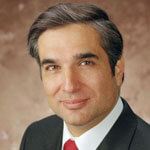
I received the news early in the morning of September 20. Roman Hlatky, M.D., a highly valued faculty neurosurgeon at The University of Texas Health Science Center at San Antonio, had been killed in a motor vehicle accident on his way home from University Hospital. True to his character and training, Dr. Hlatky had worked late into the evening performing surgery. He was going home to his wife and son to get a few hours of sleep when another vehicle hit his SUV from behind. Alcohol and high speed allegedly played a role in the collision. Dr. Hlatky’s vehicle careened into a concrete pole.
When Dr. Hlatky died, the Health Science Center – and South Texas – lost a man of integrity who devoted his life to family, education, research and caring for victims of trauma. A native of Slovakia who studied in the Czech Republic, Dr. Hlatky’s focus was on maximizing brain function after trauma. It was a privilege to have such a talented person come to our country and provide his talents. What a tragedy it is to lose such an individual to something as senseless as being a victim of a driver allegedly under the influence of alcohol or a drug.
Statistics don’t lie. More than 39,000 fatal crashes occurred in our nation during 2005, and alcohol played a role in 39 percent of them, according to the Fatality Analysis Reporting System of the National Highway Traffic Safety Administration. Texas roadways were the scene of 3,104 fatal crashes; 45 percent of these were alcohol-related. Closer to home, 125 fatal crashes occurred in San Antonio. At least 38 percent were alcohol-related, according to the San Antonio Police Department.
We have known for years that people should not drink and drive, and tougher penalties have been enacted. But unfortunately, existing penalties remain insufficient. Too many people with impaired ability to see, judge and react safely are getting behind the wheel, headed for accidents that would be avoided by not drinking or by appointing a designated, non-drinking driver.
Dr. Hlatky was involved in perhaps the most exacting subspecialty in all of medicine. The residency program to become a neurosurgeon is the longest of all residencies. His clinical expertise was in neuro-oncology, neurotrauma and general neurosurgery. The patient always came first with him.
Dr. Hlatky was a vital part of the initiative to rebuild our neurosurgery residency program under the direction of David F. Jimenez, M.D., F.A.C.S., professor and chairman of the department of neurosurgery. There is a national shortage of physicians, and the recruitment as well as the retention of neurosurgeons in academic medicine has been a challenge for health science centers throughout the country. Our department and residency program have been rebuilt in a very short time, thanks to recruits such as Dr. Hlatky. We must now face the challenge to find another neurosurgeon with his expertise and dedication. Even more importantly, the delivery of care to trauma patients in our community has suffered immensely as a result of the loss of Dr. Hlatky.
There will never be another person like him. Dr. Hlatky had a quick wit and incredible intelligence to support his exemplary dedication. As a surgeon, I feel deeply the loss of a member of the surgical profession. As president of the Health Science Center, I feel just as deeply for the community and region. Someone whose hands had healed so many could not be healed at the accident scene, and we are left to look for another who can succeed him, but truly never take his place. It is the responsibility of every one of us to prevent people from driving while under the influence of alcohol or other substances that impair judgment. The injury or death of anyone as a result of a drunk driver is an unacceptable tragedy.
Francisco G. Cigarroa, M.D., is president and professor of pediatric and transplantation surgery at The University of Texas Health Science Center at San Antonio.

